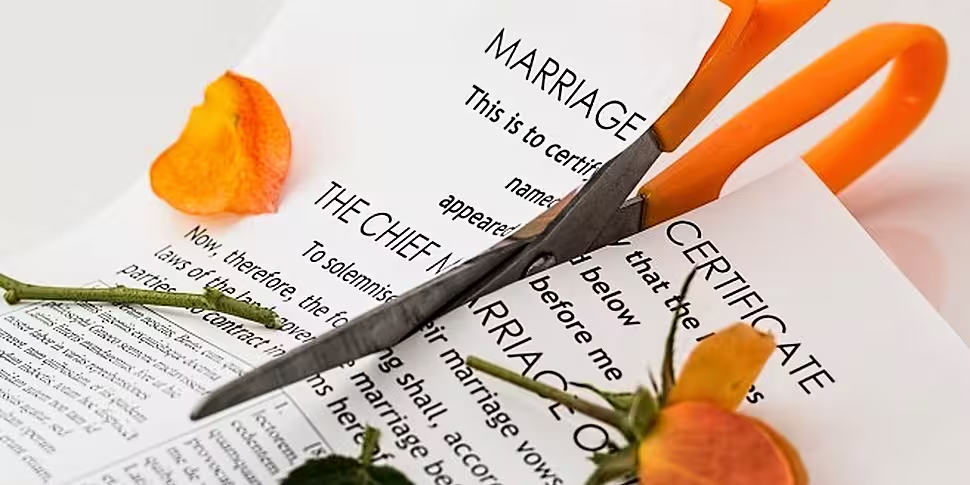With the oft-criticised length of time it takes to end a marriage back on the agenda, the possibility of a second divorce referendum is currently being floated.
But what of the financial cost to couples who have fallen out of love and want to make it official?
Eoin McGee of Prosperous Financial Services recently joined Breakfast Business to outline the various steps required to disentangle yourself – and how much it will hurt your bank balance.
Dispiritingly for those heading down that route, McGee says that a clean break isn't always on the cards...
"You'd be surprised by the amount of clients that I come across who are five, six, seven after the divorce and they're still operating out of joint bank accounts, they still haven't divided the assets down.
"It is a really tough process... But the sooner you start to separate off bank accounts, look at the life cover policies, start dividing up the savings accounts and start getting stuck into the nitty-gritty, the less problems you'll have in the future."
Essentially, get rid of those joint bank accounts as soon as possible:
"It's just ammunition for an argument."
Best case scenario
If things have ended on relatively civil terms, all the better.
"If you want to do it yourself and both parties are in agreement, typically this is a very simply case," says McGee.
"You can do it for a couple of hundred euros because some court fees and stuff have to be paid.
"That's probably the most amicable way of doing it – if everything can be agreed, you walk into court, you get it rubber stamped and you pay a couple of hundred euros.
"You can also get a little bit of help with the paperwork. There are services out there who aren't actually legal firms but what they'll do is they'll help you with the paperwork. They tend to be online services and they'll charge you up to €500 but won't go to court with you."

More complicated situations may require mediation.
"Mediation is very, very good for working out the financials but is actually really useful [as well] for sorting out any arrangement with the kids.
"Because that's not ideally [an issue] to be resolved in court. "
Next up is the solicitors, as things get expensive:
"From a solicitor's perspective, €15,000 to €20,000 wouldn't be unusual per party."
The message here being, if things haven't broken down irrevocably, you're best off trying to work things out yourselves.
Principle asset
"[Some] 35% of the family wealth tends to be pensions and 40% of the family wealth tends to be the house," explains McGee. "So they're a huge portion of overall assets. Pensions tend to be put to one side, ignored, or come up as a last minute thing. But they're usually a big item."
"So the house is reasonably straightforward, depending on what side of the negative equity fence you're on.
"And this is why a lot of couples actually ended staying together and why it's likely the incidence of divorce was lower during the recession. You were stuck together – there was no value in the house.

"Imagine you have a €200,000 house and a €300,000 mortgage. When you walk away, if you're lucky, the bank will give you a €50,000 loan each to cover the shortfall. And they will separate you off. But, in most cases, the bank will leave the two of you together and both of you will be responsible for that €100,000.
"If you're on the opposite side and you've a bit of equity there, courts are trying to push – particularly for couples with tracker mortgages – to keep people in the family home.
"Think about it. A €250,000 [tracker] mortgage will probably save you about €75,000 to €80,000 over that 25 years. There is a value in that alone. You can use a tracker mortgage to get the equivalent of cheaper rent... so that can be cost-effective."
"This is important. People think 'there's €400,000 in my wife's pension so therefore I'm entitled to half of that'.

"You're entitled to half of what was accumulated in what is called the 'relevant period' – how much was accumulated during the period of the marriage. That's actually a reasonably easy thing to do for a defined contribution pension.
"Again, the courts try to leave that to one side. They try to say 'right, what other assets have we here so we don't have to split up this pension'.
"There's a lot of inequalities when it comes to dividing pensions. If your husband takes a chunk of their pension and gives it to you, it reduces their ability to fund their pension but it doesn't affect yours, and so on and so forth."
The complexity of pensions
"So there are big problems with pensions and it is a very complex area but it is much easier than on the defined benefit side [where an employer promises a specified pension payment upon retirement]," McGee continues.
"The defined benefit side? This is where it starts to get complicated. So one of the problems you have first of all is establishing how much is it worth.
"The Society of Actuaries have a set formula that they use to say 'this is the value of this pension'. It's the benefits that you have accumulated during the relevant period.
"Either you establish what the value of it is now and you divide it down that way and you split it, that's one way of doing it.
"Or the second option is, you wait until retirement and there's a pension adjustment order put on it to say 'you have accumulated €20,000 of income from 65 years of age onwards during the relevant period'. [Each] spouse will be entitled to €10,000 a year. Lots riding on that one actually working out though!"









